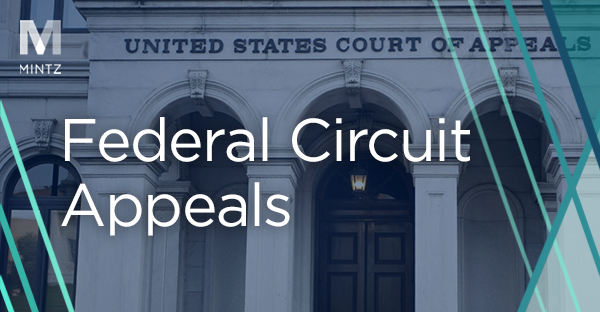
Patent Litigation
Viewpoints
Filter by:
Domestic Industry Alive and Well at ITC; Important New Opinion Continues Trend
February 1, 2022 | Blog | By Jonathan Engler, Marguerite McConihe, Michael Renaud
The U.S. International Trade Commission (the “ITC”), in an important new opinion, recently extended a series of final determinations that complainants had satisfied the “economic prong” of Section 337’s domestic injury requirement. This decision reinforces the Commission’s critical role in defending U.S. intellectual property rights and bodes well for patent owners. In Certain Percussive Massage Devices, Inv. No. 337-TA-1206, the Commission found that complainant Hyperice Inc. proved it had “significant” domestic industry investments in labor, notwithstanding that all of the domestic industry devices were manufactured overseas. Indeed, thus far in 2022, the Commission has found the economic prong of the domestic industry requirement satisfied in all four public final determinations. In 2021 and 2022 combined, the Commission found the economic prong of the domestic industry requirement satisfied in 80% of all patent-based investigations that resolved on the merits, demonstrating that Complainants with well-organized, substantiated domestic industry cases continue to meet with success at the ITC.
Read more
Trade Secret Misappropriation Not Sufficiently Plead Where Defendant Possessed but did Not Threaten to Disclose Trade Secret Information in Southern District of New York Case
January 25, 2022 | Blog | By Adam Samansky, Nicholas Armington
Last year, the U.S. District Court for the Southern District of New York addressed an issue of first impression concerning what constitutes “misappropriation” under the Defend Trade Secrets Act (DTSA) in a decision potentially relevant to cases involving allegations of trade secret misappropriation under the DTSA against a former employee. This case is worthy of note for any trade secret practitioner and is an important reminder that when pleading alleged trade secret misappropriation, it is not only important to describe the trade secret with sufficient particularity, but also to sufficiently describe the alleged misappropriation so as to illustrate the alleged acquisition of the trade secret by improper means or disclosure of the trade secret without consent.
Read more
Written Description Requirement Challenges: Federal Circuit Decision Sheds Light on How Expert Testimony Can Help
January 21, 2022 | Blog | By Brad M Scheller, Meena Seralathan
Earlier this month, in Novartis Pharms. Corp., Inc. v. Accord Healthcare, Inc., et al., No. 2021-1070, the Federal Circuit issued a helpful decision concerning the not-often-discussed written description requirement. The panel specifically addressed whether sufficient written description can exist for claim limitations that are not explicitly or directly disclosed in the specification (including negative claim limitations). This new ruling provides patent owners with a useful guide for successfully navigating similar written description challenges in patent infringement cases. For example, Patent Owners seeking to combat written description requirement challenges should proffer expert witnesses who can clearly articulate how they understand the patent description in relation to the claims and what portions of that description support the same.
Read more
USPTO’s New Deferred Subject Matter Eligibility Response Pilot Program
January 21, 2022 | Blog | By Brad M Scheller, Meena Seralathan
Recently, the U.S. Patent and Trademark Office (“USPTO”) published a notice informing the public that it will be implementing a pilot program (called the Deferred Subject Matter Eligibility Response Pilot Program, or the “DSMER Pilot Program”) to determine the value of allowing applicants to defer responding to 35 USC § 101 rejections (commonly known as “101 rejections” or “Alice rejections”). The Program is only available for certain applications, and certain procedures are required for participation; however, the Program has the potential to encourage more efficient patent prosecution. Below we answer some questions patent applicants are likely to have about the Program.
Read more
Entire Market Value Rule Strikes Again in WDTX
January 19, 2022 | Blog | By Brad M Scheller, Marguerite McConihe, Robert Sweeney
On January 3, 2022, Magistrate Judge Susan Hightower granted a defendant’s motion to exclude an expert’s damages theory for violating the entire market value rule, reminding plaintiffs everywhere to use caution when applying the sales of an entire product as a royalty base.
Federal Circuit Affirms Dismissal of Hatch-Waxman Defendants for Lack of Venue and Failure to State a Claim
November 12, 2021 | Blog | By Adam Samansky, Peter Cuomo, Joe Rutkowski
On November 5, 2021, the U.S. Court of Appeals for the Federal Circuit in Celgene Corp. v. Mylan Pharmaceuticals Inc., Case No. 21-1154, affirmed a decision from the District Court of New Jersey dismissing a suit brought by Celgene Corporation (“Celgene”) under Rule 12(b)(6) for improper venue as to defendants Mylan Pharmaceuticals Inc. (“MPI”) and Mylan Inc. and for the failure to state a claim against defendant Mylan N.V. Celgene had brought suit after MPI submitted an ANDA seeking approval to market a generic version of the drug Pomalyst used to treat multiple myeloma. In assessing venue, the court held that it was MPI’s ANDA submission to the U.S. Food and Drug Administration (“FDA”), and not the sending of a notice letter to Celgene in New Jersey, that was the artificial act of infringement pursuant to the Hatch-Waxman Act. The district court thus held, and the Federal Circuit affirmed, that venue in New Jersey was improper.
Read more
Federal Circuit Clarifies that Willful Infringement Does Not Require Egregious Conduct
October 26, 2021 | Blog | By Adam Samansky, Peter Cuomo, Joe Rutkowski
On September 28, 2021, in a precedential opinion, the United States Court of Appeals for the Federal Circuit, in SRI Int’l, Inc. v. Cisco Systems, Inc., Nos. 2020-1685, -1704, clarified its decision from a prior appeal in the same case to hold that a finding of willful infringement requires only deliberate or intentional infringement, not egregious, wanton, malicious, or bad-faith infringement conduct.
Read more
Invalidity of Terminal Patents Not Tied to Disclaimed Patent-in-Suit’s Expiration
October 6, 2021 | Blog | By Andrew DeVoogd, Courtney Herndon
In an interesting recent case of first impression, Judge Albright in the Western District of Texas denied a motion for judgement on the pleadings filed by Defendants Google and YouTube because the asserted patent was terminally disclaimed to two other patents that had been invalidated prior to its issuance. In VideoShare, LLC v. Google, LLC, 6:19-cv-663 (W.D. Tex. Sept. 29, 2021) (Albright, J.), the Court rejected the argument that the invalidation of the terminal patents was the “expiration” of the terminal patents, and that the asserted U.S. Patent No. 10,362,341 (“the ’341 patent”) was therefore also necessarily expired because it allegedly shares the expiration date of the terminal patents. Judge Albright concluded that, to the contrary, the prior finding of invalidity of the terminal patents had no impact on the expiry of the terminally-disclaimed ’341 patent.
Read more
Custom Servers Pin Netflix In the Eastern District of Texas
September 30, 2021 | Blog | By Daniel Weinger, Jessica Perry
Patent owners searching for an appropriate venue for cases against alleged infringers may be able to point to the activity of an infringer’s agents, based on a new decision from the Eastern District of Texas. In recommending denial of a Netflix motion to dismiss, Magistrate Judge Payne explained that the nature and extent of Netflix’s relationship with internet service providers (“ISPs”) within the district gives rise to proper venue as a regular and established place of business of Netflix.
Read more
The Road Less Travelled: Why Arbitration is an Increasingly Attractive Alternative for Resolving IP Disputes
September 26, 2021 | Blog | By Matthew Hurley, Michael Renaud, Oliver Ennis
N.D. Ill. Finds that a Foreign Parent Corp. May be Sued Under BPCIA Without the U.S. Subsidiary that Signed and Filed aBLA
September 21, 2021 | Blog | By Thomas Wintner, Adam Samansky, Joe Rutkowski
In what appears to be a case of first impression, on August 23, 2021 U.S. District Judge John Z. Lee of the United States District Court for the Northern District of Illinois denied a biosimilar applicant’s motion to dismiss a patent infringement suit brought under the Biosimilar Price Competition and Innovation Act (“BPCIA”) against a foreign parent corporation that did not file or sign the relevant abbreviated Biologics License Application (“aBLA”).
Read more
Genus Claims: Foiled again by Written Description
September 16, 2021 | Blog | By Thomas Wintner
In late August of 2021, the Federal Circuit reversed a jury verdict of $1.2 billion in favor of Juno Therapeutics and Sloan Kettering Institute because the jury’s finding that four of the asserted patent claims did not lack adequate written description under 35 U.S.C. § 112 was not supported by substantial evidence.
Read more
US Open for FRAND Business: The Fifth Circuit Vindicates Ericsson, Finding that Ericsson’s Offers were FRAND
September 3, 2021 | Blog | By Michael Renaud, Daniel Weinger, Meena Seralathan
The United States FRAND jurisprudence had a recent watershed moment in a decision that is sure to reverberate through the standard essential patent (SEP) world, and specifically SEP litigation in the United States. Earlier this week, a Fifth Circuit panel affirmed a jury verdict that found licensing offers made by Ericsson to HTC for Ericsson’s 4G SEPs complied with Ericsson’s FRAND obligations, the first jury verdict of its kind in the United States.
Read more
EXCLUSIVE RIGHTS: Intellectual Property — Patent Damages Deep Dive with Mintz and BDO – Part II of II
July 29, 2021 | Podcast | By Andrew DeVoogd, Daniel Weinger
In Part II of this damages-focused series of the EXCLUSIVE RIGHTS: Intellectual Property podcast, Mintz IP attorneys Drew DeVoogd and Daniel Weinger join guest David Duski of BDO for a more detailed discussion of apportionment of damages in patent litigation.
Read more
EXCLUSIVE RIGHTS: Intellectual Property — A Patent Damages Deep Dive with Mintz and BDO — Part I of II
July 22, 2021 | Podcast | By Andrew DeVoogd, Daniel Weinger
In this episode of the EXCLUSIVE RIGHTS: Intellectual Property podcast, Mintz IP attorneys Drew DeVoogd and Daniel Weinger welcome guest David Duski for the first of a two-part series covering patent trial damages.
Read more
Supreme Court Hammers Final Nail in the IP Bridge v. TCL Coffin
July 2, 2021 | Blog | By Michael Renaud, Daniel Weinger
On Monday, the Supreme Court denied TCL Communication’s certiorari petition, without comment, appealing the Federal Circuit’s ruling that the essentiality of a patent claim is a question for the jury rather than judges to resolve during claim construction. The denial of cert by the Supreme Court cements the Federal Circuit ruling which made proving infringement of standard essential patents easier by allowing reliance on the standard to show such infringement.
Read more
Arthrex SCOTUS Ruling: The IPR Show Must Go On, Just with (a Bit) More Oversight
June 24, 2021 | Blog | By William Meunier, Brad M Scheller, Andrew DeVoogd
On Monday, in a highly-anticipated decision, a fractured Supreme Court issued its opinion in Arthrex v. Smith & Nephew, striking a portion of the America Invents Act (AIA) as unconstitutional—but providing an effectively toothless remedy.
Read more
Fast Track to Justice for Trade Secret Theft at the ITC: New Senate Bill Would Expand ITC Authority to Curtail Trade Secret Theft by Foreign Governments
June 23, 2021 | Blog | By Michael Renaud, Rich Gervase, Nicholas Armington
Amid the continuing threat to U.S. intellectual property rights posed by foreign actors, the International Trade Commission (ITC) is poised to become the latest federal agency to bolster protections for U.S. IP owners. The ITC’s broad power to exclude the importation into the U.S. of products that infringe American intellectual property now has the potential to be made even more robust through a new bill introduced by Senators John Cornyn (R-Tex.), Christopher Coons (D-Del.), and Todd Young (R-Ind.) on June 15, 2021, that would provide expedited relief for trade secret theft victims.
Read more
ITC’s New Pilot Program to Speed Investigations Merely Another Bite of the 100-Day Pilot Program Apple?
May 18, 2021 | Blog | By Daniel Weinger
Over the last decade, patent litigation has exploded at the International Trade Commission (“ITC”), which has caused the ITC to seek out ways to increase efficiency. Several years ago, the ITC introduced an early 100-Day pilot program to dispose of dispositive issues early on in investigations. While now a mainstay, the 100-Day pilot program is rarely utilized.
Read more
The Federal Circuit Provides New Guidance for Patent Licensees Wishing to Challenge the Licensed Patent’s Validity
April 21, 2021 | Blog | By Brad M Scheller, Peter Cuomo, Monique Winters Macek, Mark Hammond
The Federal Circuit in Apple Inc. v. Qualcomm Incorporated handed down a decision on April 7, 2021 that provides guidance on the determination of standing for patent licensees who wish to contest the validity of a patent or patents in a licensed portfolio.
Read more
Explore Other Viewpoints:
- Data Centers & Digital Infrastructure
- AI: The Washington Report
- Antitrust
- Appellate
- Arbitration, Mediation & Alternate Dispute Resolution
- Artificial Intelligence
- Awards
- Bankruptcy & Restructuring
- California Land Use
- Cannabis
- Class Action
- Complex Commercial Litigation
- Construction
- Consumer Product Safety
- Corporate Governance (ESG)
- Cross-Border Asset Recovery
- DEI Legal Developments
- Debt Financing
- Direct Investing (M&A)
- Diversity
- EB-5 Financing
- Education & Nonprofits
- Employment
- EnforceMintz
- Environmental (ESG)
- Environmental Enforcement Defense
- Environmental Law
- Environmental, Social, and Corporate Governance (ESG)
- FDA Regulatory
- False Claims Act
- Federal Circuit Appeals
- Financial Institution Litigation
- Government Law
- Growth Equity
- Health Care
- Health Care Compliance, Fraud and Abuse, & Regulatory Counseling
- Health Care Enforcement & Investigations
- Health Care Transactions
- Health Information Privacy & Security
- IP Due Diligence
- IPRs & Other Post Grant Proceedings
- Immigration
- Impacts of a New US Administration
- Insolvency & Creditor Rights Litigation
- Institutional Investor Class Action Recovery
- Insurance & Financial Services
- Insurance Consulting & Risk Management
- Insurance and Reinsurance Problem-Solving & Dispute Resolution
- Intellectual Property
- Investment Funds
- Israel
- Licensing & Technology Transactions
- Life Sciences
- Litigation & Investigations
- M&A Litigation
- ML Strategies
- Medicare, Medicaid and Commercial Coverage & Reimbursement
- Mergers & Acquisitions
- Patent Litigation
- Patent Prosecution & Strategic Counseling
- Pharmacy Benefits and PBM Contracting
- Portfolio Companies
- Privacy & Cybersecurity
- Private Client
- Private Equity
- Pro Bono
- Probate & Fiduciary Litigation
- Products Liability & Complex Tort
- Projects & Infrastructure
- Public Finance
- Real Estate Litigation
- Real Estate Transactions
- Real Estate, Construction & Infrastructure
- Retail & Consumer Products
- Securities & Capital Markets
- Securities Litigation
- Social (ESG)
- Special Purpose Acquisition Company (SPACs)
- Sports & Entertainment
- State Attorneys General
- Strategic IP Monetization & Licensing
- Sustainable Energy & Infrastructure
- Tax
- Technology
- Technology, Communications & Media
- Technology, Communications & Media Litigation
- Trade Secrets
- Trademark & Copyright
- Trademark Litigation
- Unified Patent Court (UPC)
- Value-Based Care
- Venture Capital & Emerging Companies
- White Collar Defense & Government Investigations
- Women's Health and Technology




